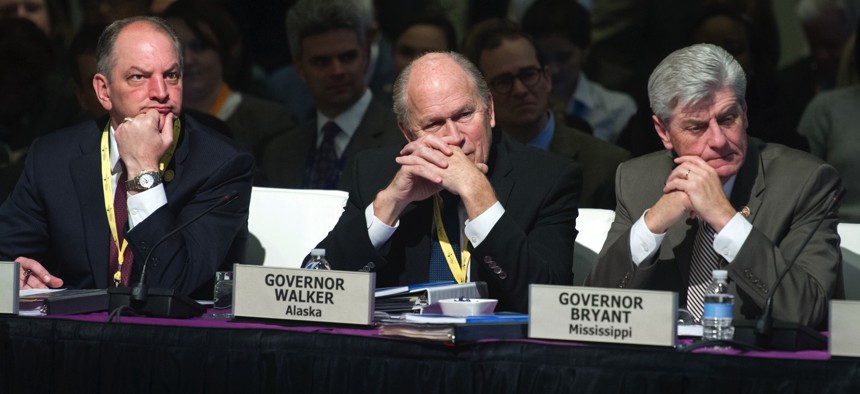Alaska Governor Wants to Re-Plumb State Finances to Depend Less on Energy Sector

Louisiana Gov. John Bel Edwards, left, Alaska Gov. Bill Walker, center, and Mississippi Gov. Phil Bryant, right, at the National Governors Association winter meeting on Sunday, Feb. 21, 2016. Cliff Owen / AP Photo
“We need to take the volatility of oil out of funding government,” Gov. Bill Walker tells Route Fifty.
WASHINGTON — With a state budget deficit that is around $3.5 billion, Gov. Bill Walker believes Alaska has arrived at a point where its fiscal problems can no longer go unsolved.
“We have to fix it this year. We can’t kick the can down the road,” Walker told Route Fifty during an interview at the National Governors Association winter meeting in the nation’s capital on Saturday.
Central to the Last Frontier’s fiscal troubles are declines in its oil sector. For decades, Alaska’s coffers were awash in revenue that flowed from the oil industry. Since the late 1970s, copious amounts of crude oil pumped from the North Slope region of the state were sent south via the Trans-Alaska Pipeline System.
Alaskans have been unburdened by state sales or income taxes. Many also receive annual payments from state investment earnings on mineral royalties, which come in the form of “dividend” checks. For eligible residents, those checks were $2,072 last year.
Between 2005 and 2014, oil dollars provided about 90 percent of Alaska’s unrestricted general fund revenues—money that goes to pay for basic government services, according to a presentation prepared by Gunnar Knapp, a professor of economics at the University of Alaska, Anchorage’s Institute of Social and Economic Research.
But times are changing.
Oil prices have collapsed during the last two years, while production in Alaska has been steadily tapering off, dropping from 1.8 million barrels per day in 1991 to about 500,000 barrels per day in 2014, according to the U.S. Energy Information Administration. The downslide in production is expected to continue through 2040.
“We need to reduce our spending,” was one of the first things Walker, who was elected as an Independent in 2014, said when asked about the state’s finances. But there are other steps the governor says are critical as well.
Perhaps most notably: “We need to take the volatility of oil out of funding government.”
One way to do this, which he supports, is by “re-plumbing” the state’s finances so that more government spending can be paid for with earnings made off of the state’s massive “permanent fund,” a pool of investments that is upwards of $50 billion.
Under a constitutional amendment Alaska voters approved in the 1970s, a set share of the money the state receives in oil royalties, and other types of payments tied to mineral extraction, must get funneled into the fund. While the principal is off limits, the state can spend the fund’s “realized” earnings, such as bond interest, real estate rent payments and stock dividends.
“Take the stable source of income, which is the earnings from the permanent fund and put that in to fund government,” Walker said.
“This last year, we made more money on our money than we did on our resources,” he later noted. “Now, one of our biggest resources is our sovereign wealth.”
The governor mentioned other options for shoring up the budget as well.
“We haven’t increased our fuel tax since John Kennedy was president,” he explained. An income tax is also a possibility. “We’re looking at that,” the governor said.
Fishing and tourism are two other important industries in Alaska, but both pale in comparison to the behemoth presence the energy sector has had in the state. While policymakers there are looking for ways to diversify the economy, it takes time.
“You don’t flip a switch and suddenly have a diversified economy,” Walker said.
In the meantime, the governor believes Alaska has healthy balances in its reserve accounts. “We’re really in a strong position, we’ve got about $8 billion in two different savings accounts that was set aside during the high oil years, that’s separate from the permanent fund,” he said.
“That’s being used now,” Walker added. “We’re trying to stop drawing down on that.”
In early January, Standard and Poor’s downgraded its credit rating on Alaska’s general obligation debt to AA+ from a sterling AAA.
A negative outlook was attached to the rating, and Standard and Poor's said the "downward rating transition will likely persist" if lawmakers in Alaska did not enact significant fiscal reforms in the 2016 legislative session.
Walker said state officials had plans to meet with all three major credit ratings agencies in New York on Tuesday this week.
As for moving the state away from its heavy reliance on oil revenue, the governor said: “This shift could have been made 30 years ago, 20 years ago.”
Recently, he said he re-read a speech by former Alaska Gov. Jay Hammond, who was in office between 1975 and 1982. In the speech, Hammond spoke about reducing the dependence of the state economy on oil. “He was absolutely right,” Walker said. “That was in 1976.”
ALSO on Route Fifty: “Economists Tell Governors That a Recession Is on the Horizon”
Bill Lucia is a Reporter for Government Executive's Route Fifty.
NEXT STORY: Economists Tell Governors That a Recession Is on the Horizon






